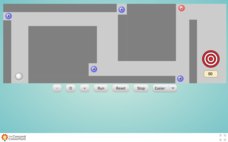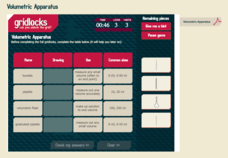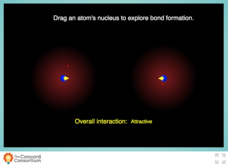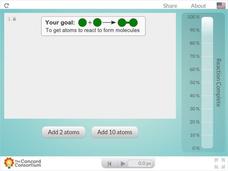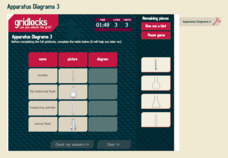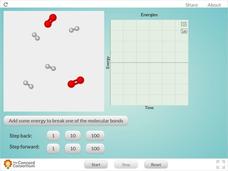Chemistry Collective
Virtual Lab: ATP Reaction (Thermochemistry and Bonding)
If you've ever felt a little drained ... try converting some ATP to ADP! Science scholars perform one of life's most important reactions using a simulated lab workbench. The fun-to-use interactive allows pupils to control the reactants...
Chemistry Collective
Virtual Lab: Unknown Acid and Base Problem
Looking for an easy way to give your class experience with acid-base chemistry outside the lab? Try a detailed interactive that puts them in total control! Young chemists determine the dissociation constant and concentration of an...
Chemistry Collective
Virtual Lab: Temperature and the Solubility of Salts
Can your scholars solve the mystery of why salts dissolve? A virtual workbench allows them to experiment with temperature and solubility with no solution prep and no post-lab clean up! Users determine the solubility of a variety of...
Chemistry Collective
Virtual Lab: Glucose Dilution Problem
There's no diluted learning here! Young chemists conduct a virtual lab exploration to practice their stoichiometry skills. By manipulating simulated solutions, they create a solution of a specific glucose molarity.
Chemistry Collective
Virtual Lab: Standardization of NaOH with a KHP solution: Acid Base Titration
This is not your standard standardization lab! Take titration into the high-tech age with a simulated workbench. Learners perform titrations to standardize a sodium hydroxide solution using a KHP solution of unknown concentration....
PhET
Beer's Law Lab
Beer's Law can be used to measure the concentration of certain compounds in samples of food. In the concentration simulation, particpants change and measure the concentration of different solutions by manipulating various types of...
Magic of Physics
Loads Lab
Take a load off! Introduce junior engineers to the effects of load on structural design with an easy-to-use interactive. Individuals apply one of many load options, examine its effects, then learn about the safeguards employed during...
PHET
Capacitor Lab
The first capacitor was a Leyden jar, invented in 1745. Physics scholars explore capacitors in an engaging simulation. They may view one or set up circuits which contain two to three either in series or parallel. Other views include...
Concord Consortium
Electrostatics: Maze Game
Ready to have an a-MAZE-ing time teaching electrostatics? Introduce physical science superstars to an engaging resource that tests their knowledge of attractive and repulsive forces. Pupils change the charge of a ball to guide it through...
Royal Society of Chemistry
Volumetric Apparatus
Can your class tell the difference between a burette and a pipette? Develop their lab apparatus knowledge using a series of puzzles. The online activity associates the name, image, and sizes of burettes, pipettes, volumetric flasks, and...
Magic of Physics
Springs Lab
Stretch young minds in their understanding of springs! Add an interesting interactive to promote awareness of factors such as stiffness, ground friction, and air resistance. The resource contains custom controls, allowing individuals to...
Magic of Physics
Materials Lab
Why is wood good for building houses, but not the best choice for high-rise apartments? Future materials scientists put building materials to the test using a hands-on interactive. Pupils pull and push on substances such as reinforced...
Concord Consortium
Forming a Molecule
What does it look like when two atoms bond? Mol-e-COOL! Aspiring chemists observe the interaction between two atoms forming a bond in an easy-to-use interactive. Individuals move atoms closer together and observe changes in attraction...
Concord Consortium
Concentration and Reaction Rate
Does concentration affect the rate of a chemical reaction? Science scholars observe and control a chemical reaction in an interactive simulation. The resource allows pupils to add atoms to the reaction vessel and monitor the reaction's...
Concord Consortium
Oil and Water
If you don't get along with someone, it's said that the two of you are like oil and water. Why is this? Explore the phenomenon and explain the phrase in one resource! Science superstars first observe samples of oil and water together....
Concord Consortium
Direction of Force on Charged Objects
Make your unit on magnetism a force to be reckoned with! Physical science scholars examine the direction of force on charged objects through a simple interactive. Pupils control the charge of the stationary object, then observe how it...
Concord Consortium
Energy of a Pendulum
Just a swingin'! Introduce physical science scholars to the energy forms associated with a pendulum using a simple interactive. Learners adjust the height from which the pendulum starts, then observe changes in potential, kinetic, and...
Royal Society of Chemistry
Apparatus Diagrams 3
Glassware everywhere! How do you help scholars learn to identify the different types of laboratory glassware? Introduce them to some of the main tools of the trade through interactive puzzles. Users match and manipulate items based on...
CK-12 Foundation
Atoms to Molecules: Constructing Helium
Protons and neutrons and electrons, oh my! Physical science scholars get hands-on with interactive atomic modeling. Starting with a simple helium atom, participants create and name ions, then build isotopes. Questions throughout the...
Concord Consortium
Atom and Ion Builder
Explore and control the building blocks of atoms! Physical science superstars add and remove subatomic particles to create atoms and ions with an easy-to-use interactive. An alternate activity includes an assignment that focuses on the...
Concord Consortium
The Temperature-Volume Relationship
What effect does temperature have on the volume of a gas? Observe the temperature-volume relationship through an animated simulation. The user controls the temperature, and a moveable piston reacts to increased or decreased thermal...
Royal Society of Chemistry
Common Compounds
Can your young chemists identify the most commonly used chemicals in the lab? Introduce the class to the go-to substances in most middle and high school chemistry experiments with an interactive. The resource offers timely feedback as...
Physics Classroom
Universal Gravitation
Are you feeling weighed down by your current gravitation presentation? Assign a hands-on interactive instead! Physics scholars work through a series of progressively harder questions about mass, distance, and gravity using an online...
Concord Consortium
Reaction Between Hydrogen and Oxygen Molecules
When molecules of hydrogen and oxygen are combined, how does water form? Science scholars observe changes in kinetic and potential energy during a chemical reaction in an interactive. The resource features easy controls that allow users...








